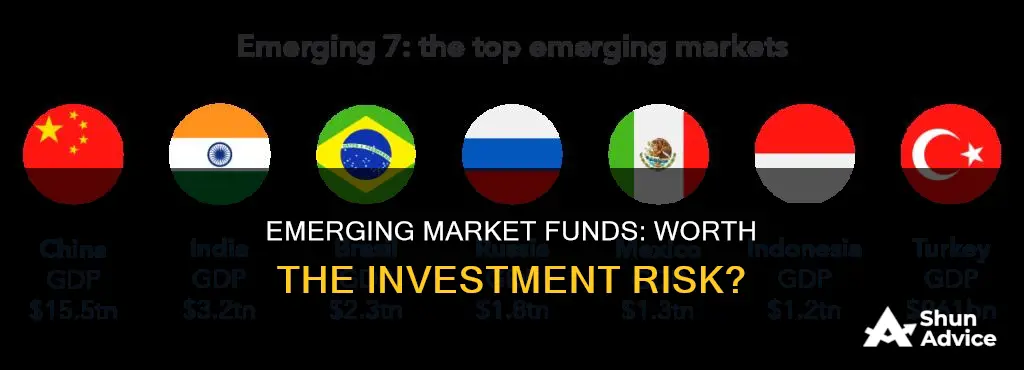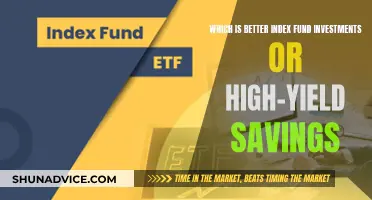
Investing in emerging markets can be a double-edged sword. On the one hand, these developing economies offer the allure of high growth and diversification for investment portfolios. On the other hand, they come with significant risks and volatility. So, is it wise to invest in emerging market funds? The answer lies in understanding the dynamics of these markets and carefully weighing the pros and cons.
| Characteristics | Values |
|---|---|
| Definition | Economies progressing from developing to developed |
| Typical Characteristics | High population growth, technology developments, decent valuations |
| Examples | Brazil, Russia, India, China, South Africa (BRICS); South Korea; Mexico; Saudi Arabia |
| Potential Advantages | High growth, diversification |
| Potential Disadvantages | Political risk, economic risk, currency risk, volatility |
| Recommended Allocation | 5% to 10% of a portfolio |
What You'll Learn

What are the risks of investing in emerging markets?
Investing in emerging markets can be a risky business. While it's true that emerging markets have been a popular investment area since the early 2000s, and they can offer huge gains, the risks are sometimes understated.
Firstly, there's the risk of investing too late in an emerging market. By the time an emerging market economy becomes common knowledge, it may be too late to invest. For example, by the time most people became aware of the growth of the Chinese economy, it was already well on its way to becoming a powerhouse.
Secondly, emerging markets are volatile. The process of becoming a developed economy is rarely a smooth upward trajectory. Countries can face political upheaval or natural disasters that can seriously stymie their economic growth, which can be costly for investors. For example, Russia has alternated between being an emerging market and a developing economy since the 1990s due to the aftermath of communism and poor monetary management.
Thirdly, emerging markets often have unstable governments, which can cause serious consequences for investors. Political risk refers to the uncertainty of adverse government actions and decisions, and it's a significant factor in emerging markets.
Fourthly, emerging markets may suffer from economic instability, including insufficient labour and raw materials, high inflation or deflation, unregulated markets, and unsound monetary policies.
Fifthly, the value of emerging market currencies compared to the dollar can be extremely volatile. Currency fluctuations can impact the total return of an investment, and any investment gains can be lessened if a currency is devalued or drops significantly.
Other risks include lax insider trading restrictions, difficulty in raising capital due to poor banking systems, poor corporate governance, and increased chances of bankruptcy.
In summary, while investing in emerging markets can produce substantial returns, investors must be aware of the risks and carefully consider their investment strategy.
Pension Funds: Collective Investment Schemes Explained
You may want to see also

What are the advantages of investing in emerging markets?
Investing in emerging markets can be a great way to diversify your portfolio and gain exposure to fast-growing economies. Here are some advantages of investing in emerging markets:
High Growth Potential
Emerging markets are characterised by their high growth potential. These are economies that are progressing towards becoming 'developed' countries, and they often experience rapid economic growth. The biggest advantage of investing in emerging markets is the potential for high returns. Countries like Brazil, Russia, India, China, and South Africa, known as BRICS, are popular choices due to their explosive growth in the past decade.
Diversification
Emerging markets can add diversification to your investment portfolio. By investing internationally, you can offset the impact of economic downturns in any single country or region, including the US. Emerging markets also tend to have lower correlation with developed markets, so their volatility has a muted impact on a global portfolio.
Population and Technology Growth
Emerging markets often benefit from high population growth and technological developments. This provides a strong consumer base and innovative opportunities for companies operating in these markets.
Competitive Advantage
Emerging markets may have a competitive advantage as exporters of low-cost raw goods to richer nations. Many of these countries have adopted market-friendly policies to attract foreign investment, making them attractive destinations for investors.
Strong Economic Fundamentals
Many emerging markets have strong economic fundamentals, such as positive macroeconomics, strong companies with low valuations, and fast growth. They also tend to have younger populations relative to developed economies, as well as government and private investments in technology, infrastructure, and education that can fuel growth and wealth creation.
Tax Managed Mutual Funds: When to Invest for Maximum Benefits
You may want to see also

How can you invest in emerging markets?
Investing in emerging markets can be a way to diversify your portfolio and gain exposure to companies in fast-growing countries with developing economies. However, it is important to remember that emerging markets come with higher risks due to their volatile nature. Here are some ways you can invest in emerging markets:
Exchange-Traded Funds (ETFs)
ETFs are a popular way to gain exposure to emerging markets. They offer a diversified investment by providing a blend of stocks from various sectors and countries. ETFs are also easy to trade, making them a convenient option for investors. Examples of emerging market ETFs include Vanguard Emerging Markets (VWO) and iShares MSCI Emerging Markets ETF (EEM).
Mutual Funds
Mutual funds that focus on emerging markets can also provide diversification and help mitigate risks. These funds typically hold many companies, allowing for more diversification than if investors tried to create their own holdings. Mutual funds are a good option for retirement funds as they offer a more hands-off approach, leaving the stock-picking to the fund manager.
American Depositary Receipts (ADRs)
ADRs are non-U.S. company stocks that trade on U.S. stock exchanges. The prices of ADRs follow the prices of the underlying companies in their home markets. Examples of emerging market ADRs include Taiwan Semiconductor Manufacturing (TSM) and Indian bank ICICI Bank (IBN).
Direct Investment
You can also invest directly in companies listed in stock markets in emerging markets or those in your home country that operate in these markets. However, this option requires more research and can result in a less diversified portfolio. Additionally, investing directly in foreign stock markets may subject you to the investment taxes and laws of the host country.
Emerging Market Index Funds
Emerging market index funds are similar to ETFs but are priced at the end of each trading day. In contrast, ETFs can be bought and sold like common stock throughout the trading day.
When investing in emerging markets, it is important to consider your risk tolerance and investment goals. Consult a financial advisor to tailor a strategy that aligns with your specific circumstances.
Strategies for Investing in Third Point Hedge Fund
You may want to see also

What are the best emerging markets to invest in?
Investing in emerging markets can be a great opportunity for growth and diversity in your retirement portfolio. However, it is important to remember that with high growth potential comes high risk.
Emerging markets are economies that are in the process of rapid growth and development. They are often characterised by volatile markets, higher growth and investment potential, and stronger economic growth. While there is a lot of potential for huge gains, the risks involved can be significant and are sometimes not well understood. Political upheaval, natural disasters, and economic downturns can all impact emerging markets and cause serious consequences for investors.
- China: China has been an emerging market success story. Since reforming its economy in 1978, the country has averaged almost 10% annual GDP growth. China is home to several internationally known companies, including Alibaba and Tencent. With the country reopening after its zero-COVID policy, now could be a good time to invest.
- India: India was the fastest-growing major economy in 2022 and is projected to continue its economic growth in 2023, albeit at a slower pace due to tightening monetary policies.
- Brazil: Brazil's economic growth has been impacted by the global economic slowdown, but it still has a projected GDP growth rate of 2.1% for 2023. The country is also a major exporter of commodities, which could strengthen due to greater global demand.
- Russia: Despite facing international sanctions due to the Ukraine invasion, Russia's economic growth projections by the IMF for 2023 have been raised. The country has access to large amounts of oil reserves and mineral deposits, which make it likely to evolve into a developed country in the future.
- South Korea: South Korea is a democracy that is home to several global companies, such as Samsung Electronics, Kia Corporation, and Hyundai Motor Company. The country's success has sparked a debate about whether it should still be considered an emerging market.
- Southeast Asia: While Southeast Asia is still in the early stages of developing a strong economy and stable environment, it has the potential for growth.
- Middle East: Similar to Southeast Asia, the Middle East is in the early stages of economic development and could be a good investment opportunity for those looking for long-term growth.
- Africa: Africa also falls into the category of regions that are working towards establishing a robust economy and stable environment.
When investing in emerging markets, it is generally recommended to look at funds that hold broad baskets of emerging markets to diversify your portfolio and minimise risk. Exchange-traded funds (ETFs) and mutual funds that focus on emerging markets can be a good option, as they offer a blend of stocks from various sectors and countries. Additionally, American Depositary Receipts (ADRs) of non-US companies that trade on US stock exchanges can be a way to gain exposure to emerging markets.
It is important to remember that investing in emerging markets should be done with a long-term perspective, as these markets can be volatile in the short term. Consult a financial advisor to tailor your investment strategy according to your risk tolerance and investment goals.
Vanguard Index Funds: Best Bets for Your Money
You may want to see also

What are the pros and cons of investing in emerging markets?
Investing in emerging markets can be a double-edged sword. On the one hand, it offers the potential for high growth and diversification. On the other hand, it comes with significant risks and volatility. Here are some detailed points to consider:
Pros:
- High Growth Potential: Emerging markets are characterised by rapid economic growth, outpacing developed countries. This provides an opportunity for investors to capitalise on this growth and achieve higher returns.
- Diversification: Investing in emerging markets can help diversify your portfolio. By investing internationally, you can reduce the impact of economic downturns in specific countries or regions, such as the US.
- Global Operations: If you are hesitant about the risks of investing directly in emerging markets, you can consider investing in UK or US companies with global operations, including in developing countries. This way, you gain exposure to emerging markets while mitigating some of the risks.
- Population and Technology Growth: Emerging markets often experience high population growth and technological developments. This can fuel economic growth and create favourable conditions for investments.
- Competitive Advantage: Many emerging markets have a competitive advantage as exporters of low-cost and raw goods to richer nations. This can boost their trade and economic prospects.
Cons:
- Political Risk: Emerging markets may have unstable governments and are more prone to political unrest, which can have serious consequences for investors.
- Economic Risk: These markets often face challenges such as insufficient labour and raw materials, high inflation or deflation, unregulated markets, and unsound monetary policies.
- Currency Risk: The value of emerging market currencies compared to the US dollar can be highly volatile. Currency devaluation or significant drops in value can erode investment gains.
- Volatility and Unpredictability: Emerging markets tend to be more volatile than developed markets due to their reliance on commodity exports and other factors. This volatility can make returns unpredictable, and investors may struggle to time their investments optimally.
- Country-Specific Setbacks: A country's progress towards becoming a developed economy can be hindered by various factors, such as political and social unrest or natural disasters. These setbacks can be costly for investors.
- Market Complexity: Emerging markets often present a complex landscape for companies and fund managers due to varying legal systems, market structures, and instability. This complexity reduces market efficiency and creates additional risk for investors.
In summary, investing in emerging markets offers the potential for high growth and diversification but carries significant risks and volatility. It is crucial for investors to carefully consider their risk tolerance, conduct thorough research, and ideally seek advice from a financial advisor before investing in these markets.
Index Funds: A Beginner's Guide to Investing in Australia
You may want to see also
Frequently asked questions
Emerging markets can offer growth and diversity to your retirement portfolio. They can benefit from rapid growth and potentially high returns, which can beat their developed counterparts. They also tend to benefit from high population growth, technology developments, and decent valuations.
There are big risks involved in investing in emerging markets. These include political risk, economic risk, and currency risk. Political unrest, insufficient labor and raw materials, high inflation or deflation, unregulated markets, and unsound monetary policies can all negatively impact investments. The volatility of emerging markets can also make returns unpredictable.
There are a few ways to invest in emerging markets, including through mutual funds or ETFs that focus on emerging markets, American Depositary Receipts (ADRs), and U.S.-listed international exchange-traded funds and mutual funds. It is recommended to consult a financial advisor with experience in international investments to determine the best strategy for your risk tolerance and investment goals.







